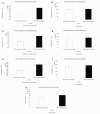Placebo-resistant gut bacteria: Akkermansia muciniphila spp. and Familial Mediterranean fever disease
- PMID: 38465231
- PMCID: PMC10920240
- DOI: 10.3389/fcimb.2024.1336752
Placebo-resistant gut bacteria: Akkermansia muciniphila spp. and Familial Mediterranean fever disease
Abstract
Introduction: Despite numerous investigations into the impact of drugs/probiotics on the gut microbiota composition in Familial Mediterranean Fever (FMF) patients, the question as to whether there exists a significant bacterial diversity(ies) independent of the placebo effect that can be reliably considered in clinical and nutritional trials remains unresolved.
Methods: This study represents the in augural analysis of the placebo's influence on the gut microbiota of both healthy individuals and FMF afflicted men, utilizing previously collected data from PhyloChip™ DNA microarray experiments. A total of 15 healthy and 15 FMF male volunteers, aged 18 to 50, participated in this partially randomized placebo trial, which is accessible through the GEO Series accession number GSE111835.
Results and discussion: Key findings from current investigations include i. the anticipated divergence in gut bacteria resistance to placebo between healthy and FMF individuals, ii. the minor impact of placebo on gut bacterial diversities in healthy individuals, with Enterobacteriaceae diversities identified as placebo-resistant among "healthy" gut bacteria, and iii. the comprehensive influence of placebo on all bacterial phyla in the gut microbiome of FMF patients, extending to nearly all bacterial genera, except for the resilience of gut Akkermansia muciniphila spp. to placebo in FMF patients. This study underscores the susceptibility of Faecalibacterium, Blautia, and Clostridium genera to placebo. Consequently, this investigation holds significance for the proper design of placebo-controlled trials and establishes a foundation for further exploration of the gut-brain axis. Furthermore, it contributes valuable insights to discussions regarding proposals for probiotic therapies, particularly focusing on Faecalibacterium spp., Blautia spp., and Clostridium spp.
Keywords: Akkermansia muciniphila; Blautia; Enterobacteriaceae spp.; Faecalibacterium; familial Mediterranean fever; male patients; microbiome; placebo.
Copyright © 2024 Pepoyan, Marotta, Manvelyan, Galstyan, Stepanyan, Grigoryan, Grigoryan, Mikayelyan, Balayan, Harutyunyan, Mirzabekyan, Tsaturyan, Torok and Pepoyan.
Conflict of interest statement
The authors declare that the research was conducted in the absence of any commercial or financial relationships that could be construed as a potential conflict of interest.
Figures



Similar articles
-
Gut Akkermansia muciniphila, Prevotellaceae, and Enterobacteriaceae spp. as Possible Markers in Women-Related Nutritional and Clinical Trials: Familial Mediterranean Fever Disease.Womens Health Rep (New Rochelle). 2024 Oct 10;5(1):785-793. doi: 10.1089/whr.2024.0076. eCollection 2024. Womens Health Rep (New Rochelle). 2024. PMID: 39439767 Free PMC article.
-
Lactobacillus acidophilus INMIA 9602 Er-2 strain 317/402 probiotic regulates growth of commensal Escherichia coli in gut microbiota of familial Mediterranean fever disease subjects.Lett Appl Microbiol. 2017 Apr;64(4):254-260. doi: 10.1111/lam.12722. Epub 2017 Feb 27. Lett Appl Microbiol. 2017. PMID: 28140472
-
Gut Microbiota between Environment and Genetic Background in Familial Mediterranean Fever (FMF).Genes (Basel). 2020 Sep 3;11(9):1041. doi: 10.3390/genes11091041. Genes (Basel). 2020. PMID: 32899315 Free PMC article. Review.
-
Commercial microbiota test revealed differences in the composition of intestinal microorganisms between children with autism spectrum disorders and neurotypical peers.Sci Rep. 2021 Dec 20;11(1):24274. doi: 10.1038/s41598-021-03794-8. Sci Rep. 2021. PMID: 34931007 Free PMC article.
-
Interventions for reducing inflammation in familial Mediterranean fever.Cochrane Database Syst Rev. 2018 Oct 19;10(10):CD010893. doi: 10.1002/14651858.CD010893.pub3. Cochrane Database Syst Rev. 2018. Update in: Cochrane Database Syst Rev. 2022 Mar 29;3:CD010893. doi: 10.1002/14651858.CD010893.pub4. PMID: 30338514 Free PMC article. Updated.
Cited by
-
Whole-genome sequencing and genomic analysis of four Akkermansia strains newly isolated from human feces.Front Microbiol. 2024 Dec 16;15:1500886. doi: 10.3389/fmicb.2024.1500886. eCollection 2024. Front Microbiol. 2024. PMID: 39736996 Free PMC article.
-
Gut Akkermansia muciniphila, Prevotellaceae, and Enterobacteriaceae spp. as Possible Markers in Women-Related Nutritional and Clinical Trials: Familial Mediterranean Fever Disease.Womens Health Rep (New Rochelle). 2024 Oct 10;5(1):785-793. doi: 10.1089/whr.2024.0076. eCollection 2024. Womens Health Rep (New Rochelle). 2024. PMID: 39439767 Free PMC article.
References
-
- Balayan M., Manvelyan A., Marutyan S., Isajanyan M., Tsaturyan V., Pepoyan A., et al. . (2015). Impact of Lactobacillus acidophilus INMIA 9602 Er-2 and Escherichia coli M-17 on some clinical blood characteristics of Familial Mediterranean Fever disease patients from the Armenian Cohort. Int. J. Probiot. Prebiot. 10, 91–95.
-
- Balayan M., Pepoyan A., Manvelyan A., Tsaturyan V., Grigoryan B., Abrahamyan A., et al. . (2019). Combined use of eBeam irradiation and the potential probiotic Lactobacillus rhamnosus Vahe for control of foodborne pathogen Klebsiella pneumoniae . Ann. Microbiol. 69, 1579–1582. doi: 10.1007/s13213-019-01522-2 - DOI
Publication types
MeSH terms
Supplementary concepts
LinkOut - more resources
Full Text Sources
Molecular Biology Databases
Miscellaneous

